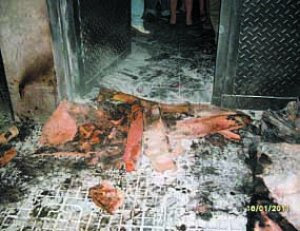Two of my favorite blogs out there - Towleroad and Joe.My.God. - picked up on a video that shows the great Cyndi Lauper entertaining a bunch of stranded passengers facing delayed flights out of Buenos Aires by singing "Girls Just Want To Have Fun".
Lauper was flying back to the United States from Argentina after performing in Buenos Aires Friday night.
That night, Lauper and her tour production team had invited two very special guests: José Maria Di Bello and Alex Freyre, the first gay couple to marry in all of Latin America (they are all pictured right, with the husbands wearing red ribbon sashes).
I asked Alex to share his thoughts on meeting Lauper and here is what he wrote:
Cyndi wanted to meet us and we were invited to attend the show and meet her backstage.
We told her how we spent the night before we got married listening to her entire "True Colors" CD since it was the only one we had brought along! And how we danced to it during our secret stay at the hotel.
She seemed surprised. I don't think she was aware that Argentina had passed a marriage law - at least that's what I understood - and [she was even more surprised] about our story.
She said: "You are heroes!" and we told her that her inspiration had been very valuable to us; that she was an activist who had left her mark; and that we had always admired her for that and loved her for how she was.José and Alex were among a number of same-sex couples who jumpstarted the push for marriage equality in Argentina by going to the courts and demanding the right to marry. In November of 2009, in the first ruling of its kind, a court in Buenos Aires ruled that it was unconstitutional to deny them marriage rights and granted them the permission to marry.
As long-time HIV treatment and prevention advocates, they planned a marriage ceremony for December 1st, 2009, but mere hours before the ceremony a second court ordered a stay.
Realizing that the stay only applied to Buenos Aires - and with the assistance of a few legal advocates and a number of LGBT-rights organizations - the couple found out that the Governor of Tierra del Fuego, Fabiana Rios, was willing to officiate a civil marriage ceremony.
So, in utter secrecy, the couple made their way to the southernmost region in the Americas. When Alex mentions the couple spent the night before the wedding dancing to "True Colors" during their secret stay at the hotel, it was because they told almost no one about their plan to marry in Tierra Del Fuego and people only found out about it after the ceremony had taken place.
That ceremony took place on December 28th, 2009.
Argentina, of course, would later become the first country in Latin America to pass a law granting all Argentinean gay couples the right to marry.
On Twitter, if you understand Spanish, you can follow the couple as follows: José Maria Di Bello tweets here and Alex Freyre tweets here.
Cyndi Lauper, by the way, tweets here.
























